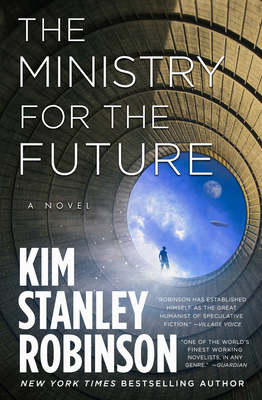I am old enough to remember the novels of the 70’s and 80’s which depicted averted nuclear holocausts. Nuclear obliteration was avoided through the heroic actions of a central character, striving against the forces of communist evil (or the military-industrial complex of the west).
Why mention this? Kim Stanley Robinson’s novel, The Ministry for the Future, is in so many ways a better book than any of those thrillers. But, they do share a feature. In the 70’s and 80’s, the cold war was very real, and the threat of nuclear war was part of the general discourse. However, atomic catastrophe seemed in some way something that fate would roll the dice on: something out of our everyday control. So those books brought the pleasure of the thrill, and I can’t remember ever jumping out of the narrative to worry about the threat they portrayed.
So: this climate ‘fiction’ book gave me two different feelings as I read it: the parts where the narrative drew me in, and I didn’t wake from the readers dream and worry. And the parts where the discussion about climate change, and its impacts, and how to alter the banking system to fix perverse incentives woke me up. Into worry, and into thinking about whether the ideas would work, and how fictional they actually are. And at the end I was left wondering which book I liked better: the one that drew me in as a great novel should; or the one that made me wake up and think.
There are some truly great sections. The opening chapters, which depict the human consequences of a heat wave in the third world are extraordinary. Some later scenes between the head of the ministry and others wondering about the ethics of certain actions had the feel of the debates between characters in old Russian novels: the sorts of conversations you wish you were smart enough to participate in.
Should you read it? Yes. It is a great book. And it has a lot of interesting things to say about how climate change is playing out, and how things might turn out if we act in certain ways. (Sorry: vague here to avoid spoilers).
Is it Kim Stanley Robinson’s best book? No. I think that is The Years of Rice and Salt, which is a long form exploration of rebirth, reincarnation and an alternative history of the development of America, which is far from everyone’s cup of tea. I also don’t think its as good as his ‘Mars’ books, which share its tone. Read it, and see whether you can stay in the narrative or not. You’ll enjoy the ride and learn something as you do.
We need more books about climate change. Books that feature it. Books where it is part of the background. Because, in the end, climate change isn’t fiction, but fiction can help us learn how to live in a world where that is true.
